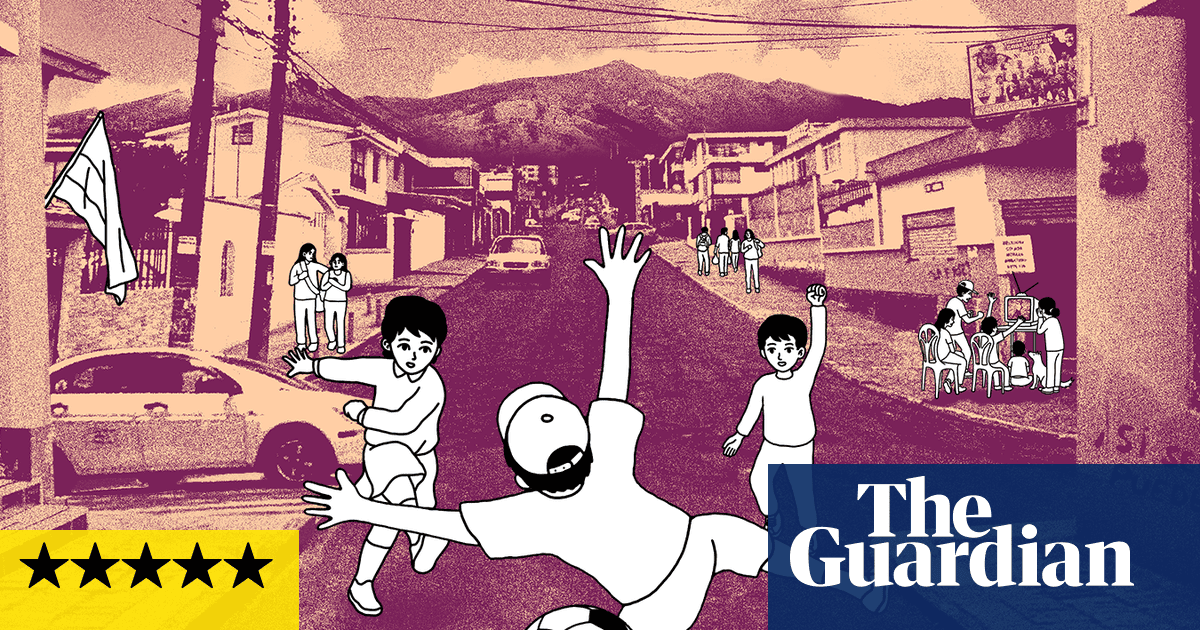Video games have been simulating football since the 1970s, but they have rarely ever thought about simulating fandom. You can play a whole international tournament in the Fifa titles, but what they never show is the way the competition seeps into the everyday lives of supporters, how whole towns are overtaken, how aWorld Cupcan become a national obsession. The way most of us experience the really big matches is through stolen moments of vicarious glory on televisions and giant pub screens, surrounded by friends and family and the sounds and images of real life.
This is the territory of Despelote, a beautiful, utterly transportive game about childhood and memory, set during Ecuador’s historic 2002 World Cup qualifying campaign. Football-mad eight-year-old Julián – a semi-autobiographical version of the game’s co-designer Julián Cordero – has just watched the team beat Peru, but now four more matches stand betweenEcuadorand the World Cup finals in Japan and Korea. Structured as a series of short, immersive tableaux, Despelote gives us control of Julián as he goes about his life, buffeted by his parents and teachers between shopping trips, car journeys and school lessons.
The key scenes are where you are left alone, perhaps in a town square, or at a family get-together – and you experience something of what it was like to be a kid given crucial moments of freedom and agency. You listen in on adult conversations, watch an old man feeding pigeons, say hi to a shopkeeper, have a kickabout with friends – the world is depicted as a series of grainy photos, washed with single colours – a beautiful visual device replicating the haziness of our oldest memories, the background details indistinct behind the personal, emotional events.
As the game goes on, depictions of Julián’s childhood merge and interchange with recollections of later teenage parties and responsibilities. We also learn about the sociopolitical background to the World Cup campaign: Ecuador is in the midst of a financial crisis, hyperinflation has bankrupted companies and gobbled up savings – in this context, the potential glory of footballing success becomes vital and talismanic. The tournament is discussed in the streets and at weddings, it permeates everything.
But other aspects of Ecuadorian life and culture are drawn in too. You learn about the music, the food and the rebirth of the domestic film industry, via the 1999 crime film Ratas, ratones, rateros directed by Julián Cordero’s father, Sebastián Cordero. In this way, real life impinges on the game world, like a poetic and self-referential Agnès Varda film, and in one lovely sequence, while Julián is engrossed in a footie sim on the family’s console, his onscreen player leaves the pitch and wanders home – to Julián’s own house: a beautiful, subtle comment on embodiment, fantasy and the act of playing.
Despelote recalls some of the great works of independent narrative game design – The Unfinished Swan, Gravity Bone, Virginia – yet it is also something thrillingly of itself. Even though it’s a game about one small boy in a specific rendering of Ecuador, it communicates the near-universal power of football as a cohesive social narrative: the way the Dutch team of 74, Maradona’s genius in 1986, and Gascoigne’s goal against Scotland at Euro 96 came to say something about the nations that produced them. At the same time, as we draw closer to the final matches of the qualifying round and the excitement and tension becomes palpable, the camera and narration pull back, beyond the structured world of the game and into a meditation on the creative process itself. This is fascinating, formally daring stuff that, in its two-hour playtime, asks more questions about the nature of memory, simulation and identity than a dozen 100-hour epics.
Sign up toPushing Buttons
Keza MacDonald's weekly look at the world of gaming
after newsletter promotion
Despelote is available now, £12
